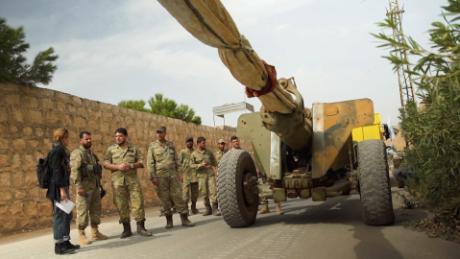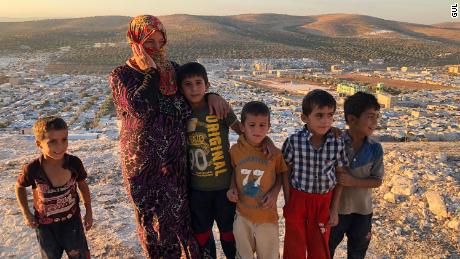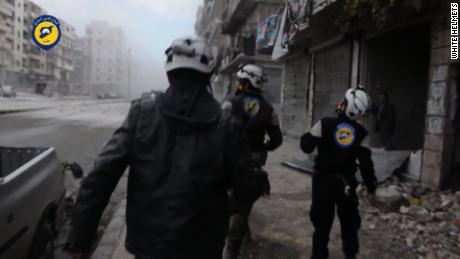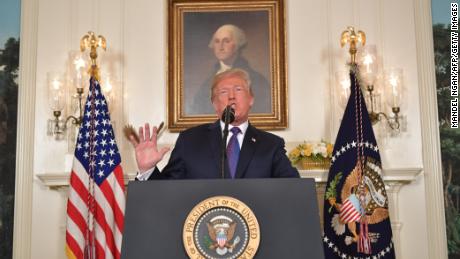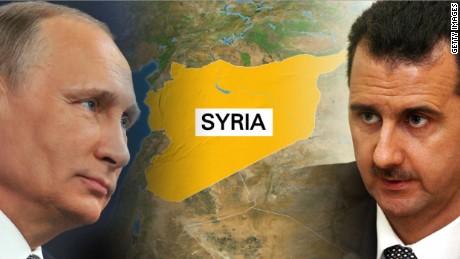Story highlights
- European leaders call for Russian attacks in Syria to cease
- President Obama denies Russian military action "challenging" U.S. leadership in Mideast
- Russia says it has launched more than 100 airstrikes in Syria
(CNN)Vladimir Putin just confirmed what many suspected -- that Russian airstrikes in Syria are meant to bolster President Bashar al-Assad's regime.
But exactly how they're doing that remains a point of contention: Are Russians really focused on pummeling ISIS, or are they targeting Syrian rebels demanding an end to the Assad dynasty?
"Our task is to stabilize the legitimate government and to create conditions for a political compromise ... by military means, of course," Putin told the state-run Russia 24 TV.
"The units of international terrorists and their ilk have no desire to negotiate with the Syrian government, who is almost sieged in its own capital."
Russia has said it's coordinating with the Syrian regime to target ISIS and other terrorists. Al-Assad has used the term "terrorists" to describe Syrians who seek his ouster.
A heavy arsenal
Since launching its first airstrikes in Syria on September 30, Russia has flown dozens of combat missions and conducted more than 100 airstrikes, according to the Russian Defense Ministry.
The Defense Ministry said Monday it conducted 55 airstrikes in Syria aimed at 53 ISIS targets over the past 24 hours.
The day before, the ministry said, Russia targeted 63 ISIS positions, including 53 strongholds, a command center, four training camps and seven ammunition depots.
Russia maintains that ISIS is its main target.
But CNN military analyst Lt. Col. Rick Francona said he has no doubt Russia is targeting Syrian rebels rather than ISIS.
"I think it's very apparent from the target sets that we're watching. Even the maps that are released from the Russians themselves show where they're concentrating their airstrikes," Francona said.
"And if you look at the map where they are hitting, most of them are concentrated in that area between Hama and Aleppo -- and that's where the Syrian rebels have had success over the past two months."
Putin: No Russian ground forces
Russia's military role in Syria will not involve a ground operation, Putin said.
"We're not going to do it, and our Syrian friends know about it," he told state TV.
Putin also said Russia has no reason to get involved in Syria's civil war.
"It is not about the foreign policy. Russian foreign policy is peace-loving without any exaggeration," Putin said.
"If you look at the world map, and see what Russia is, it becomes obvious that we do not need any foreign territories or foreign natural resources. Russia is a self-sufficient country. We do not need someone to fight and conflict with."
Proposed Russian-U.S. effort
The United States and Russia are opposed to how they view al-Assad's regime. The United States says al-Assad needs to go, but Russia has been a longtime ally of Syria during the decades of Assad family rule.
But Putin said he'd be willing to join forces with the Americans in the fight against ISIS in Syria.
"We need to work together to bring, as I said, a full exchange of intelligence information," Putin said.
He repeated his offer to cooperate with the United States in carrying out attacks in Syria. Last week, U.S. Defense Secretary Ash Carter said the United States would not cooperate militarily at a strategic level with Russia.
In an interview that aired Sunday on CBS' "60 Minutes," President Barack Obama pushed back against the view that Putin's recent military action in Syria is "challenging" American leadership in the Middle East.
"If you think that running your economy into the ground and having to send troops in, in order to prop up your only ally is leadership, then we've got a different definition of leadership," Obama said.
U.S. training efforts under fire
Putin criticized the U.S. program to help Syrian rebels, which Carter admitted this summer trained only a handful of the thousands the United States had hoped to prepare.
In the "60 Minutes" interview, Obama also addressed the faltering Syrian rebel training program saying, "There's no doubt that it did not work."
The interview was taped Tuesday before the Defense Department's announcement Friday that the $500 million program would be suspended.
"I wish they gave us $500 million. We would have spent it better in terms of fighting against international terrorism -- it's true," Putin told state TV.
He also dismissed the notion that Russia is trying to wipe out Syrian dissidents who oppose al-Assad.
"In response to the accusations against us that we carry out airstrikes on the moderate opposition, and not on ISIS and other terrorist organizations, we respond: Let's say you know better the situation on the ground. You've been there for more than a year illegally. Just give us targets, and we'll work them out."
Report: Russians foil Moscow terror attack
Russia's Security Service said Monday that it had arrested suspects who were planning a terrorist attack on Moscow, a representative told state media outlet Tass.
The representative said that the suspects had been trained in ISIS camps in Syria and that some of them had "arrived in Russia long before the start of the Russian military operation in Syria."
A bomb squad found a device with 5 kilograms (11 pounds) of explosives in a Moscow apartment as well as scales for weighing the explosive contents, mobile communications equipment and an instruction manual for making improvised explosive devices, Tass reported.


